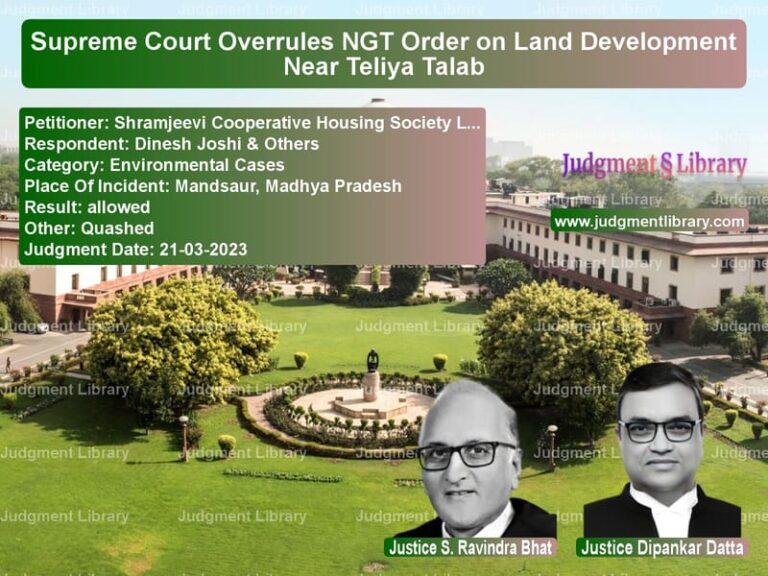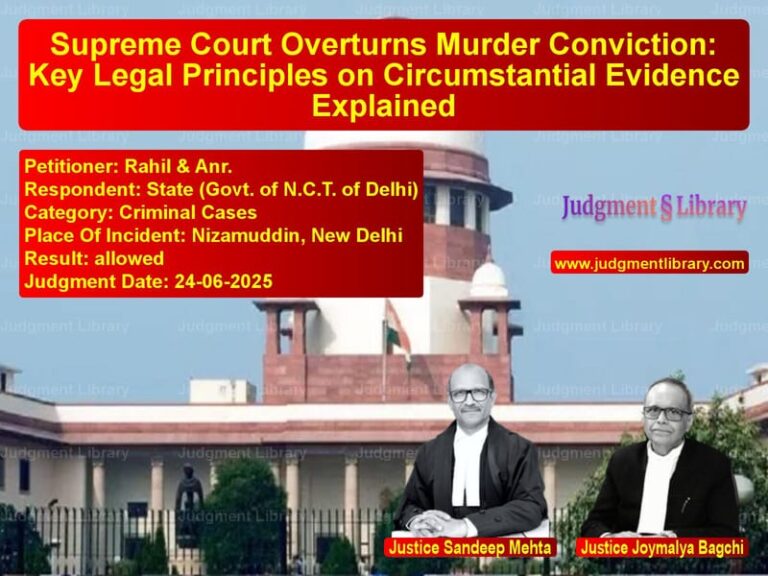BHEL Workers’ Reinstatement Case: Supreme Court Sets Aside Labour Court’s Award
The Supreme Court of India recently delivered a crucial judgment in the case of Bharat Heavy Electricals Ltd. v. Mahendra Prasad Jakhmola & Ors., addressing the reinstatement of contract workers under the Uttar Pradesh Industrial Disputes Act, 1947. The judgment overturned the Labour Court’s award, which had directed the reinstatement of workers employed through contractors, ruling that the findings of the Labour Court were perverse and contrary to evidence.
Background of the Case
The case involved a dispute regarding 64 contract workers engaged by Bharat Heavy Electricals Ltd. (BHEL) at its Haridwar facility. The dispute was referred to the Labour Court under Section 4(k) of the Uttar Pradesh Industrial Disputes Act, 1947, with the following question:
“Whether the termination of services of workman Shri Mahendra Prasad Jakhmola, s/o Late Shri Vachaspati Jakhmola, Helper by the employer, w.e.f. 13.11.2001, is justified and/or as per law? If not, what benefit/relief the concerned workman is entitled for and with what other details?”
Labour Court’s Findings
On November 1, 2009, the Labour Court ruled in favor of the workers, concluding that:
- The workers were directly employed by BHEL despite being engaged through contractors.
- The contract with the contractors was a ‘sham’ arrangement to deny workers their legal rights.
- The extended definition of ‘employer’ under the Uttar Pradesh Industrial Disputes Act applied, making BHEL liable.
- The workers were entitled to reinstatement but without back wages.
Appeals and High Court Proceedings
BHEL challenged the Labour Court’s decision before the Uttarakhand High Court, arguing that:
- The workers were engaged by independent contractors and were never BHEL employees.
- The Labour Court wrongly applied a 1990 notification under the Contract Labour (Regulation and Abolition) Act, 1970, which exempted BHEL from certain provisions.
- Gate passes issued to the workers were for security purposes and did not indicate direct employment.
On April 24, 2014, the High Court upheld the Labour Court’s decision, dismissing BHEL’s writ petition. The High Court noted:
- The workers performed duties identical to regular employees.
- The control and management of the workers were with BHEL, not the contractor.
- The contract was a mere formality and did not reflect a genuine employer-contractor relationship.
Supreme Court’s Observations
BHEL appealed to the Supreme Court, which made the following key observations:
- The Labour Court’s reliance on the 1990 notification was incorrect as BHEL was exempt from its provisions.
- There was no direct employer-employee relationship between BHEL and the workers.
- Gate passes issued for security reasons do not establish direct employment.
- The Labour Court’s decision was based on an incorrect interpretation of facts and lacked legal justification.
The Supreme Court stated:
“It would be perverse to decide based only on a concession, without more, that a direct relationship exists between the employer and the workmen.”
Regarding the application of the Uttar Pradesh Industrial Disputes Act, the Court held:
“In order for Section 2(i)(iv) to apply, evidence must be led to show that the work performed by contract labour is ordinarily part of the industry of BHEL. No such evidence has been led.”
Final Verdict
The Supreme Court set aside the Labour Court’s award and the High Court’s decision, ruling:
- The contract workers were not direct employees of BHEL.
- The reinstatement order was unjustified.
- The appeals were allowed in favor of BHEL.
Key Takeaways
- Employer-Employee Relationship: Contract workers must provide clear evidence of direct employment to claim reinstatement.
- Judicial Review in Labour Disputes: Courts must examine whether contract labor arrangements are ‘sham’ based on solid evidence.
- Scope of Industrial Laws: The extended definition of ‘employer’ under labor laws does not automatically apply without factual backing.
Conclusion
The Supreme Court’s ruling sets an important precedent on contract labor in industrial establishments. It reinforces that contractual arrangements must be carefully examined, and mere allegations of ‘sham contracts’ are insufficient to claim direct employment status. The decision protects the interests of industrial employers while ensuring that labor laws are applied correctly.
Petitioner Name: Bharat Heavy Electricals Ltd..Respondent Name: Mahendra Prasad Jakhmola & Ors..Judgment By: Justice Rohinton Fali Nariman, Justice Vineet Saran.Place Of Incident: Haridwar, Uttarakhand.Judgment Date: 20-02-2019.
Don’t miss out on the full details! Download the complete judgment in PDF format below and gain valuable insights instantly!
Download Judgment: Bharat Heavy Electri vs Mahendra Prasad Jakh Supreme Court of India Judgment Dated 20-02-2019.pdf
Direct Downlaod Judgment: Direct downlaod this Judgment
See all petitions in Employment Disputes
See all petitions in Public Sector Employees
See all petitions in Termination Cases
See all petitions in Judgment by Rohinton Fali Nariman
See all petitions in Judgment by Vineet Saran
See all petitions in allowed
See all petitions in Quashed
See all petitions in supreme court of India judgments February 2019
See all petitions in 2019 judgments
See all posts in Service Matters Category
See all allowed petitions in Service Matters Category
See all Dismissed petitions in Service Matters Category
See all partially allowed petitions in Service Matters Category







